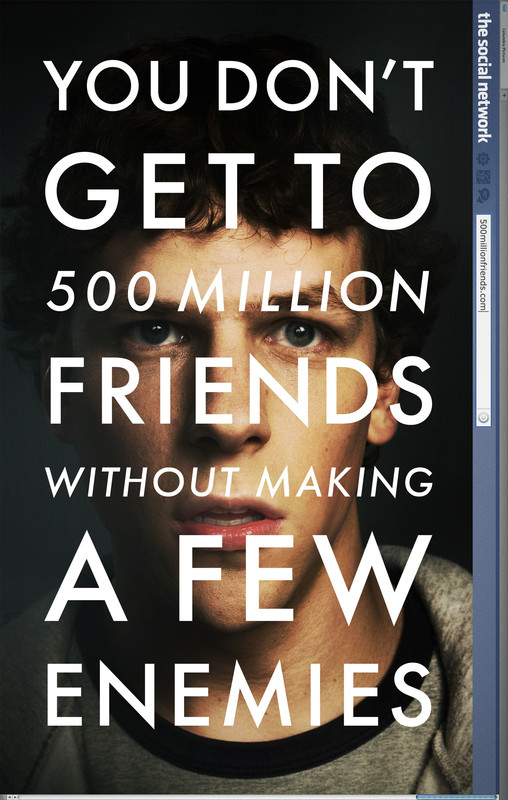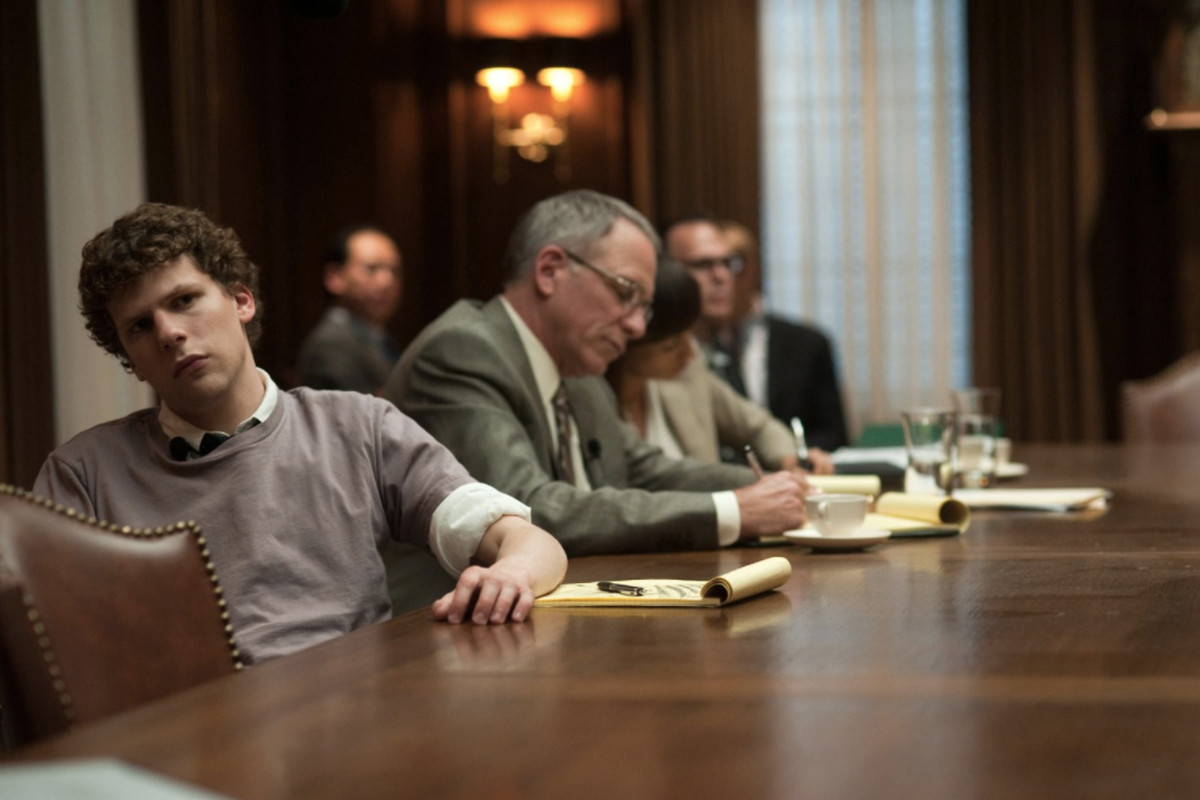Dir: David Fincher
It may boast an A List director in David Fincher, it may feature rising stars Jesse Eisenberg and Andrew Garfield (whose performance here apparently scored him the role as the new Spider-Man), it may provide other rising names like Max Minghella, Justin Timberlake, Rashida Jones and Rooney Mara with striking roles but, make no mistake, the true star of The Social Network is Aaron Sorkin.
Sorkin has form writing for film, his best effort being the underrated The American President, which is notable not only as a great near forgotten film but also as the precursor to Sorkin’s television triumph; The West Wing. If there can be said to be an auteur behind this film then it is not David Fincher but Aaron Sorkin.
The Social Network spins generation-defining myth from recent history – readers well versed in Roger Ebert’s movie glossary will note that several events here have been Libertyvalanced. It revolves around the 2004 creation of Facebook (a website you may have heard of) and the lawsuits that founder Mark Zuckerburg (Eisenberg) had to fight against three former fellow Harvard students (Armie Hammer and Minghella… and Josh Pence, sort of, we’ll get to that) who accused him of stealing their idea and turning it into Facebook and co-founder and former best friend Eduardo Saverin (Garfield), who sued after he was, allegedly, unfairly cut out of the company.
The film sets out its stall early, serving notice with the very first scene that The Social Network is going to move fast, and it expects you to keep up. That first scene; nothing more than a conversation during which Zuckerberg’s girlfriend (Mara, as appealing here as she was appalling in A Nightmare on Elm Street) breaks up with him, is a dizzying display of dialogue writing and delivery. Eisenberg immediately impresses as the almost supernaturally clever Zuckerberg, giving an impression of someone whose brain is running considerably faster than those of most other people. Sorkin’s dialogue, as ever, is not naturalistic; it’s wordy and constructed, people don’t really talk like this, but it’s not forced. There are really two reasons for that, the first is simply the use of language, Sorkin clearly loves words, and he knows how to put them together, make them specific to characters, and lodge lines, or even single words, in your head. It’s also the work of the actors; there is a clear sense that they are relishing the dialogue, and they sell every line.
At the risk of becoming dull, there really is nothing bad to say about this movie. The entire cast is excellent. Eisenberg carries the film (he’s in just about every scene) and does it with an assurance that we haven’t seen from him since his debut in Roger Dodger. Just as much a cornerstone of the film as Eisenberg is British actor Andrew Garfield. Until recently I wasn’t much of a fan of Garfield’s, having found him flat in everything I'd seen, but with this film and with Never Let Me Go I’ve changed my stance on him as an actor (if not as a potential Spider-Man). He’s great as Saverin, showing off a convincing American accent and impressing as the more down to earth counterpart to Eisenberg’s anti-social, dreamy, Zuckerberg. Another surprise is Justin Timberlake; he’s done entirely acceptable work in films like Black Snake Moan, but nothing that suggested the energy and charisma he displays as Napster founder Sean Parker.
Armie Hammer plays both Cameron and Tyler Winklevoss (the Winklevai, as Zuckerberg refers to them), in a performance that is an absolute tour de force of special effects. Eschewing the split screen technique that allowed actors as diverse as Jeremy Irons and Lindsay Lohan to play twins and appear in the same scenes as both characters, Fincher used the same computer technology that allowed him to put Brad Pitt’s face on body doubles of various shapes and sizes in Benjamin Button to allow Hammer, with the help of body double Josh Pence, to play both roles. Happily he’s terrific, and very funny, getting the best out of some of Sorkin’s best lines (including a very funny scene in which the Winklevai take their case of copyright theft to an uncaring Dean of Harvard).
The quality runs deep in this cast; Jurassic Park kid Joseph Mazello pops up as one of Zuckerberg’s roommates, Max Minghella (son of late director Anthony) shows that he’s becoming a diverse talent as Diviya Narendra, Rashida Jones is her familiar adorable self as one of the junior lawyers for Zuckerberg, and Rooney Mara is just about good enough in her two scenes to assuage a little of the doubt about Fincher casting her as Lisbeth Salander in The Girl With the Dragon Tattoo.
The technical aspects of the film are also above reproach. I usually define a good score as being one I don’t notice, but that doesn’t apply to Trent Reznor and Atticus Ross‘ work here. Their mix of a simple, recurring, piano melody and doomy electronics makes for an unusual, ultra modern, soundtrack that makes an effective counterpoint to the film. Jeff Cronenweth makes the film look beautiful, but without dazzling us with his compositions, and risking forcing us out of the drama and the editing by Kirk Baxter and Angus Wall deserves recognition too, if only because they manage to turn sequences of people doing much what I’m doing right now into action scenes.
David Fincher is a director who often imposes himself on a film; he’s as classic an auteur as anyone working today, and yet by largely getting out of the way he makes The Social Network his best and most cohesive work in a long time. Of course, you have to credit him as much as you do Sorkin and the cast the uniformly impressive performance, as much as Prieto for its visuals and as much as --- for the editing, but while the film is technically brilliant there are very few of the flourishes, the conspicuous directorial exercises, of which he is very fond (Think Panic Room's CG assisted tracking shots, taking the camera through the handle of a coffee pot because he could). He lets the actors and the script do the heavy lifting, and focuses on capturing it in the obsessively meticulous detail he’s become famous for.
I don’t for the life of me understand Facebook or its popularity (and no, this movie hasn’t changed that), but this story is nevertheless riveting and its telling just about flawless.
★★★★★



No comments:
Post a Comment